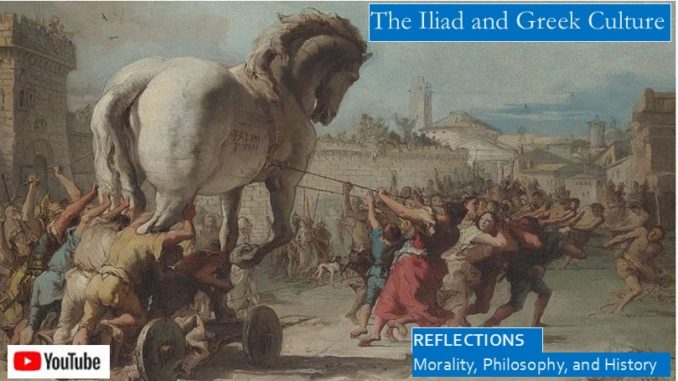
Why should a Christian ponder the Iliad by Homer, the ancient saga of the Trojan War where Grecian and Trojan warriors fight with swords and arrows and shields, where the pagan gods of Mount Olympus support and fight with one side in the war, then the other?
For three reasons, the first reason is the Iliad is a truly remarkable poem to experience. This is an epic poem that has influenced western culture and poetry to the present day. Even in English, the poetry of the Iliad is wonderful to read, and it is a reason to learn ancient Greek to read it in the original. The Iliad was the most recited poem in antiquity because of its magnificence, it speaks to your soul, your soul will be improved by listening to its message.
REFLECTIONS ON THE ILIAD
YouTube video for this blog which covers general introductory material not included in this blog: https://youtu.be/DpmuhZJUJn0
Script for this video with more book links:
https://www.slideshare.net/BruceStrom1/the-iliad-the-basis-of-greek-culture-and-the-western-philosophical-tradition
Iliad Blog 2, Captured Concubines in the Iliad and the Torah
http://www.seekingvirtueandwisdom.com/iliad_blog02/
The Iliad, blog 4, Briseis, Chryseis, Aren’t all Concubines the Same?
http://www.seekingvirtueandwisdom.com/the-iliad-blog-4-briseis-chryseis-arent-all-concubines-the-same/
Concubines in the Iliad, Old Testament, and Christian Tradition
https://youtu.be/bGHHD7XTvr0
Iliad, Blog 3, The Warrior Cultures of the Iliad and the American Indian, Bravely Visiting the Enemy Camp
http://www.seekingvirtueandwisdom.com/iliad-blog-3-visiting-the-enemy-camp-greeks-vs-indians/
https://youtu.be/ynIx-AVI2f8
The Iliad Blog 5, the Tide of Battle Turns Against the Greeks
http://www.seekingvirtueandwisdom.com/the-iliad-blog-5-the-tide-of-battle-turns-against-the-greeks/
The Iliad Blog 6, Embassy to Achilles, Oration, Failed Meeting
http://www.seekingvirtueandwisdom.com/the-iliad-blog-6-embassy-to-achilles-oration-failed-meeting/
The Iliad Blog 7, the deaths of Patroclus and Hector
http://www.seekingvirtueandwisdom.com/the-iliad-blog-7-the-deaths-of-patroclus-and-hector/
This video approximately corresponds to blogs 5 through 7, with some additional material:
The Iliad of Homer: Glory, Honor, Madness, and Futility of War: https://youtu.be/7lI2ZQ50wRc
CONTINUING WITH THE ILIAD
The second reason is the ancient world is not our modern world, the ancient world was a far more brutal world, the ancient world described in the Iliad is the same world described in the Old Testament, and to a certain extent the New Testament also. The mistake we often make when reading the ancient classics and the Scriptures, particularly the Old Testament, is we instinctively judge these works as if they were written yesterday rather than thousands of years ago.
The ancient cultures were warrior cultures, every ancient state was a warrior state, and the Greek city-states were the most successful warrior states of their era. We puzzle how a Loving God can instruct the Jews to massacre the pagans of Palestine in the Book of Joshua, and in part the answer is the God of Joshua is an ancient God who leads his chosen people into battle against the despicable foe, the God of Joshua is the God whom Miriam worships in her song, when she sings of the God who throws horse and rider into the sea after the Jews cross over the parted Red Sea. After we study the Iliad we will examine the Book of Joshua, as both ancient and modern readers have long puzzled over how to interpret this book.
The concept of conscientious objectors refusing to serve in the army or navy because they opposed killing was totally unknown in the ancient world, it was totally absurd. In the Greek city-states, all free men were expected to serve in the military. The Greek military system where the infantry formed a shield wall on the front line required constant military drill and discipline. We read how Socrates himself took pride in his military service opposing the Persians in battle.
Slavery was the reason for the warrior ethos of the ancient world. Slavery was a fact of life in ancient Greece, in ancient Israel, and everywhere in the ancient world. Indeed, commentators on Ephesians equate St Paul’s preaching in Ephesians and other epistles that slaves should cheerfully serve their master as being applicable to employees today.
Where did the slaves come from? From the vanquished foe. In the ancient world, when you defeated a bitter foe, you wiped out as much of the opposing army as possible, and you enslaved the women and children, and the young women were often forced to be concubines. This was why when the Romans defeated the Jews at the fortress of Masada in the Jewish rebellion, the men put to the sword their women and children before committing suicide themselves. There was no such thing as a prisoner of war, the soldiers who remained were either brutally enslaved, often to work in the mines, a sure death sentence in the ancient world, or they were beheaded or otherwise eliminated.
Why didn’t the ten lost tribes taken by Assyria survive? Many commentators theorize that because their captivity was so lengthy they simply assimilated. More likely their society was ripped apart when their women and children and possibly some of the men were enslaved, their families were broken up, as slaves could not worship on the Sabaoth, as slaves they had no say where they would come or go.
The Babylonian captivity where Nebuchadnezzar exiled the Jewish ruling class to Babylon, allowing their families and religious to remain intact, as brutal as this captivity was, was far more gracious than was typical in the ancient world. God surely was protecting His Chosen People when their family and national identities were not destroyed when they were uprooted to Babylon.
The third and most important reason why we, as Christians, can benefit from reading the Iliad, is because the Iliad is a story about developing moral character, asking questions like: How should we live? How should we face death? Should we question the cultural values we are born into? Like all great classics, you will be an improved person once you absorb the Iliad.
The commentary by Professor Elizabeth Vandiver, who authored the Teaching Company lectures on the Iliad, are so inciteful that we will mention them almost as much as the Iliad. Her commentary draws out much of the moral development taking place in the Iliad, where the work challenges the warrior culture of the Greeks. I encourage you to listen to these lectures as you read the Iliad.
ORIGINS OF THE ILIAD
The scholarly debate that whirls around the questions of the authorship and origins of the Iliad are very similar to the debates over the origins of the first seven books of the Old Testament, the Torah plus Joshua and Judges. Scholars mostly agree that both were a part of oral tradition long before they were written down. There are scholarly debates over whether there was a Homer, and if there was, how much of the Iliad he wrote, debates which Professor Vandiver relates so interestingly.
The Iliad and Genesis both look back at more ancient times when the gods roamed the earth and talked to men. In Genesis, the Lord walked and talked with Adam every day in the Garden of Eden, and later God talked with Cain in the fields. In the Iliad not only did certain men talk to the gods, often men spotted the gods even when they were in disguise
The Iliad was probably performed at religious festivals long before the Greek alphabet was invented. It would take around three days to recite the whole of the Iliad, how they were able to memorize these long poems is discussed at length by Professor Vandiver.[1]
Professor Vandiver also points out that the gods of ancient Greece were very different from our conception of a monotheistic, all knowing, all powerful, always compassionate deity who takes interest in the affairs of mortal men, even counting the hairs on their head. The gods were like men except they were immortal, but since they could not die, they could never gain glory, like men in battle could gain glory and honor. The gods in the Iliad could be kind, they could be vicious, they could be magnanimous, or they could be petty, they could see more than men, they could even personify the weather, they could go from here to there in an instant.
The gods were immortal, but they were not omnipotent, nor were they omniscient, but they could be wounded, though their wounds could always be healed at Mount Olympus. It is clear in the Iliad that the gods take a great interest in kings and prince and great warriors, and are particularly interested in the events of the Trojan War in particular. Many mighty mortal warriors in the Iliad, like Achilles, have a god for their mother, or sometimes their father. In the Iliad, the gods come to earth in disguise to visit this mortal or that, or even fight in the battle next to their favored mortal combatants. Sometimes the ancient Greek gods were more like X-Men than deities. Sometimes these gods seem like omniscient deities to whom mortals can pray, sometimes they pray to Apollo for healing, sometimes their battlefield wounds are miraculously closed up and healed like they were the Wolverine, sometimes they pray to Zeus for better fortune in battle, and in the Iliad Zeus hears their prayers and decides whether to grand their requests.
Are the gods also interested in the affairs of the little man, the schmucky farmer in the field, the slave, the servant, the impoverished? Not so much. Little people may offer sacrifices to appease the gods, to save them from the capriciousness of the weather and war and life, but I have not read anywhere that the little people of ancient Greece were encouraged to see Zeus as their personal friend and savior, Zeus was not a Jesus figure at all. The closest we come is the Roman stoic philosopher Dio Chrysostom saying we should sacrifice to the gods whether we think it does any god or not because it is a good thing to do.
Just as many Americans have watches the Wizard of Oz and Gone With the Wind dozens of times over the years, so the Greeks would have heard the Iliad performed many time and would have been familiar with the basic plot line of the Trojan War. This is the basic plot line from Professor Vandiver’s study guide:
- “The most beautiful woman in the world, Helen, daughter of the great god Zeus and wife of the Greek Menelaos, was abducted by the Trojan prince Paris.
- Under the command of Menelaos’ elder brother Agamemnon, the Greeks mustered an army to go to Troy and fight for Helen’s return.
- The war against Troy lasted for ten years. The fighting was fairly evenly balanced, with each side having its foremost warrior (Achilles for the Greeks, Hektor for the Trojans).
- Achilles was the son of a goddess mother, Thetis, and a human father, Peleus. Their wedding was arranged by Zeus, and Thetis was not entirely willing.
- The greatest Trojan warrior, Hektor, was killed by the greatest Greek warrior, Achilles, who was himself killed by Paris.
- Finally, the Greeks resorted to trickery. Using the famous ruse of the Trojan Horse, invented by Odysseus, they infiltrated the walled city of Troy and sacked it by night.
- The Greeks committed many outrages against the Trojans during the Sack of Troy. Foremost among these were the killing of King Priam at his household altar, the murder of Hektor’s baby son Astyanax by throwing him from the city walls, and the rape of Priam’s daughter Kassandra in the temple of the virgin goddess Athena.
- These outrages angered the gods, leading to many hardships for the surviving Greeks on their way home. Most importantly, Agamemnon was killed by his wife and her lover when he arrived home, and Odysseus spent ten years wandering on his way from Troy.”
Although Professor Vandiver does not mention it, other scholars comment that the outrages that anger the gods can be described as a cardinal Greek vice, the vice of hubris. Hubris are the excesses of arrogance, excesses of overreach, excesses you are tempted to commit when you are on top of the world, when you are winning the war, and think the ordinary virtues of temperance and reasonableness no longer apply to you, when you are deluded into believing that you can get away with anything, that your wishes and desires are for the world to fulfill. Someone who has no character is prone to committing acts of hubris. As the maxim goes, the bigger they are, the harder they fall.
The Iliad only recounts the final year of the war, and ends before the killing of Achilles and the Trojan Horse and the sack of Troy. There were other epic poems, now lost, none as grand as the Iliad, that recounted the other portions of the Trojan War, and we learn of some details from this writer or that from the ancient world. Works had to be copied by hand, and often Mongols and other barbarians burned the ancient libraries, so most ancient works are lost in the sands of history.
Elizabeth tells us that the “Homeric warrior fights for honor (timê, pronounced teemay) and glory or fame (kleos). Timê is often translated “honor.” However, its most basic meaning is the tangible, physical expression of honor in the form of booty, gifts, or a particular prize (geras). Kleos can be translated as “glory” or “fame.” In its most basic sense, kleos means “what other people say about you,” what is spoken aloud about you. Timê and kleos are closely related; one’s kleos depends to a large extent on the timê offered by one’s peers. But kleos also serves as the only true form of immortality available to Homeric heroes: they live on in what people say about them after they are dead.”
My preference is to describe the ancient cultures as warrior cultures, which differs from Professor Vandiver’s emphasis. She describes the ancient Greek culture as a shame culture, where your worth is determined by what your fellow warriors thought of you, as opposed to a more modern introspective culture, where the character of the individual is determined by his internal virtue, according to a universal or divine standard of right and wrong.[2] This is best expressed by Hector in Book 6 of the Iliad, when his wife Andromache begs Prince Hector not to return to battle, for he is now not merely her husband, but also her mother, her father, her brother, for they have all sacrificed their lives for the defense of Troy, and only he, Hector, is left:
Hector answers,
“I would die of shame to face the men of Troy
and the Trojan women trailing in their long robes
if I would shrink from battle now, a coward.
Nor does my spirit urge me on that way,
I’ve learned it too well, to stand up bravely,
always to fight in the front ranks of Trojan soldiers,
winning my father great glory, glory for myself.
For in my mind I know this well:
the day will come when sacred Troy must die.”
Hector fears the worst will come,
Hector fears that when the walls of Troy will tumble,
then his precious Andromache will be carried away enslaved,
when he fearfully tells his wife and queen:
“There is nothing, nothing beside your agony
when some brazen Argive hales you off in tears,
wrenching away your day of light and freedom!
Then far off in the land of Argos you must live,
laboring at a loom, at another woman’s beck and call.”[3]
IMHO, Ms. Vandiver’s lectures seem to infer that where our modern culture centers around an introspective internal virtue while the ancient Greek culture centers around a fear of public shame is somewhat misleading, the tension between these extremes exists both in the ancient culture and in our modern culture. You could successfully argue that Clint Eastwood and many western and war movies definitely celebrate a warrior culture that avoids shame, especially when the good guy says little and standing staring fearless. Who can forget Dirty Harry,
“We’ve got you surrounded, punks.”
“Who is we, copper?”
“Me, Smith and Wesson.”
You can also argue that this tension between a shame culture and an internal virtue culture mirrors then tension between men and women, between masculine and feminine virtues. A really good example of this tension comes from a truly wonderful book, Love and Respect, that discusses how to improve your marriage, using Ephesians 5 as your guide, where St Paul exhorts for “wives to be subject to their husbands as to the Lord,” and for “husbands to love their wives as Christ loved the church.” The subtitles wonderfully summarize the book, “The love she most desires, the respect he desperately needs.” (We will explore Ephesians in a later essay.)[4]
You can also see this tension in Elizabeth Vandiver’s discussion on how Achilles questions the very core values of his Greek warrior culture as he withdraws from battle.
Iliad Blog 2 http://www.seekingvirtueandwisdom.com/iliad_blog02/
[1] Professor Elizabeth Vandiver has a wonderful poetic sense, she quotes Longfellow to give us a sense of the rhythm of dactylic hexameter, and she quotes sections of modern poems that compare to the Iliad.
[2] Elizabeth Vandiver, “The Iliad of Homer,” lectures recorded by The Great Courses, (www.thegreatcourses.com, 1999), lectures 2-3, quotations are from the study guide.
[3] Homer, “The Iliad,” translated by Robert Fagles (New York: Penguin Books, 1990), Book 6, 210-211.
[4] Emerson Eggerichs, “Love and Respect,” (Thomas Nelson publishers, 2004).

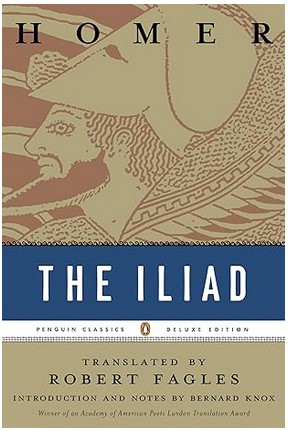



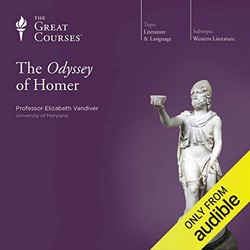
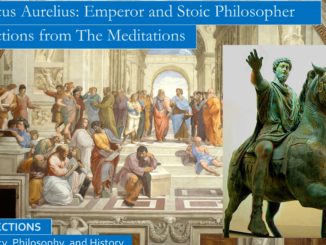
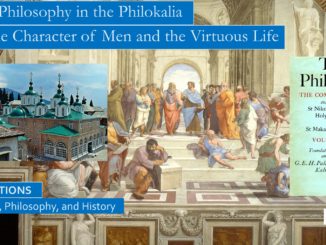
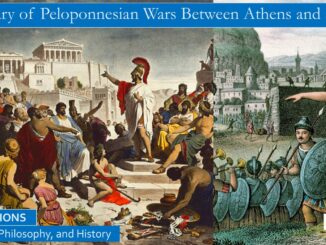
18 Trackbacks / Pingbacks